Forex vs Stocks?: Everything You Need to Know
By Jordan Blake
January 10, 2024 • Fact checked by Dumb Little Man
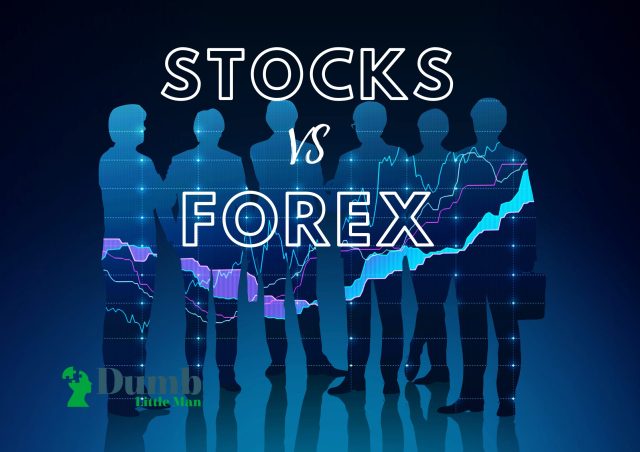
Want to jump straight to the answer? The best forex broker for traders is Avatrade
The #1 Forex Trading Course is Asia Forex Mentor
The forex exchange market offers several decent opportunities for investors to make some money. There is also the stock market. While it's okay to be invested in both these important financial industries, there are so many fundamental differences between stocks and forex. But there are also several distinct similarities including high levels of liquidity and daily trading volume.
After all, the stock and the forex markets are two of the most widely traded financial markets in the world. This is owing to their historical volume, volatility, and abundance of instructional tools available to both FX and stock traders. In this post, we will look at both stock and FX trading deeper. We will see the differences between the two, the pros and cons of each, and how to get started as a new trader.
What is Stock Trading?

Trading stocks is one of the most common ways to invest in public markets. Stocks are a type of investment that reflects a share of a publicly-traded company's ownership. In a nutshell, you will be acquiring a portion of a firm when you buy a share of its stock.
The stock market works in a somewhat same way as a public auction house. Investors negotiate prices on an exchange to purchase and sell shares of a company's stock. The trading is done during market trading hours but futures are also available after markets close. In a perfect world, you would buy a stock that you feel would rise and sell when you believe it will fall.
It is also important to note that there is a difference between stock trading and investing. Stock trading is the practice of constantly buying and selling stocks to gain short-term profits rather than long-term gains. Stock investing on the other hand hops to unlock the long-term value of a company using a long-term trading strategy.
How does Stock Trading Work?
To begin trading forex and stock markets you must first create an account with a broker. Your stockbroker will conduct the trades on your behalf whenever you're ready to start buying and selling stocks and making transactions.
These services frequently come with commissions and fees, which add up rapidly when you're constantly trading. So traders must ensure that their profits are sufficient to cover these charges. Some brokers these days also offer commission-free trading but several other fees will still apply.
Active and passive stock trading
Stock traders primarily rely on two key trading approaches. This includes active and passive trading. Active traders are always hooked to their computers, buying and selling stocks depending on the current market direction. Active trading often referred to as day trading, is an aggressive trading strategy that requires a lot of your time and effort.
Passive traders on the other hand prefer to hang onto their stocks for a bit longer—sometimes months or even a year or two. Passive traders are more prone to look at long-term patterns. They see the stock market as a place to gain profit through long-term capital appreciation and even sometimes dividend payments.
Pros and Cons of Stock Trading?
Pros
- Returns in a flash: Trading stocks can offer you an easy and quick way to earn returns on short price actions in the market.
- Stock markets have become highly democratized and can be accessed from anywhere in the world.
- It's often easier to learn how to trade stocks than forex. There is also a library of resources out there to use.
- The Stock market has thousand of stocks to buy and sell, each with unique underlying fundamentals.
Cons
- Leverage: When compared to Forex or futures trading, stock trading leverage is quite minimal.
- It may take longer to realize significant capital gains with stocks.
- Trading stocks is a bit more expensive with higher fees.
What is Forex Trading?
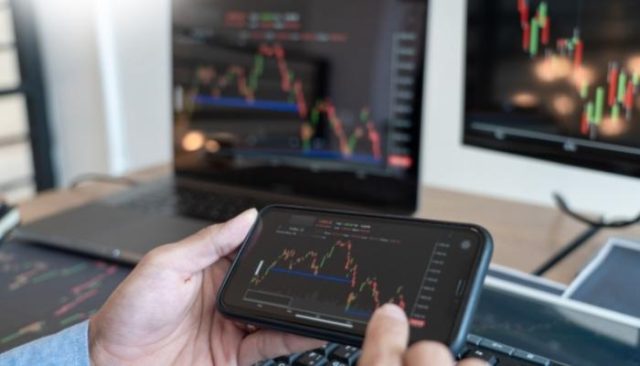
Forex trading is simply selling and buying different currencies at different quoted prices. The foreign exchange market, a worldwide marketplace operating 24 hours a day, Monday to Friday, is where all the money trading is done.
The foreign exchange market is open to retail investors around the world. But in most cases, Institutional traders, such as those who work for banks, fund managers, and multinational organizations, account for the great bulk of trade activity in the FX market. Just like the New York stock exchange and other major global markets, the foreign exchange market is highly liquid.
Forex Trading Options
Most forex transactions are performed to anticipate upcoming price fluctuations. Forex traders, like stock traders, strive to buy currencies that they feel will grow in value in respect to other currencies and sell currencies that they believe will decrease in value.b The following are three main options to consider when trading forex or a currency pair.
- The spot market – This is the principal forex market, where currency pairings are switched in real-time and conversion prices are set by the market.
- The forward market – Instead of executing a transaction immediately, forex traders might engage in a binding (private) contract letter with another trader to confirm an exchange rate price for a certain amount of currency at a later date.
- The futures market – Likewise, traders can choose to purchase or sell a specified quantity of a currency at a certain exchange rate at a future date using a standardized contract. Unlike the forwards market, this is done on an exchange rather than privately.
| RECOMMENDED TRADING COURSE | REVIEW | VISIT |
|---|---|---|
 | #1 Forex, Crypto and Stocks trading course. Ranked most comprehensive by Investopedia and Best by Benzinga. Free to Try! |  |
Pros and Cons of Forex Trading?
Pros
- Easy access: The forex market is currently one of the most accessible financial markets in terms of opening an account and trading.
- Leverage: Most forex brokers offer leveraged trading to help users take full advantage of the currency market.
- Quick returns: Depending on the forex broker chosen, income from winning forex trades might be made available for withdrawal right away.
- The forex market offers a huge variety of tradable currency pairs with a unique risk management strategy.
Cons
- Currency values: Unlike stock valuations, currency valuations are based on a variety of variables that may or may not be visible in the market.
- Lower regulation: Because the forex industry is unregulated, many online forex brokers operate with little or no oversight.
- Patience is required: Successful trading usually necessitates patience while waiting for favorable opportunities to present themselves.
| Broker | Best For | More Details |
|---|---|---|
 | Advanced Non US Traders Read Review | securely through Avatrade website |
 | Intermediate Non-US Traders Read Review | securely through FXCC website |
Overall Broker | securely through Forex.com website | |
 | Professional Forex Traders Read Review | securely through Interactive Brokers website |
Similarities Between Stock Trading and Forex Trading?
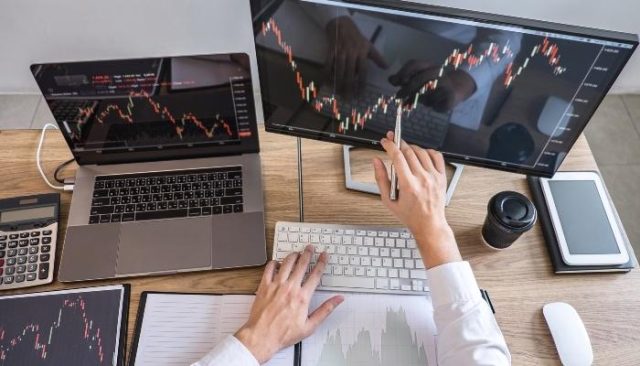
Although there are many distinctions between forex and stock trading, they do have certain similarities. Both forex and stock trading involve profiting from short-term price fluctuations, and both carry the danger that the stock or currency pair you are holding onto may fall in value.
Furthermore, forex traders, like stock traders, depend extensively on technical analysis to predict likely market fluctuations and guide trading decisions. Finally, to make a consistent profit, both forex and stock trading require a solid basic grasp of how markets function.
Tools, terminology, reactivity to news and ways to engage in the market are some of the other commonalities. There will always be certain geopolitical and economic factors that will affect trading strategies in the forex and stock market. Also, both Forex and stocks have evolved into a digital platform that is mostly utilized by traders who trade from their homes or offices.
It is also important to note that both the forex market and the stock market are both very liquid. This simply means that there is sheer trading volume each day. As such, it's very easy to have your orders filled at the most appropriate price possible. In fact, the New York Stock exchange has a daily trading volume of around $15 trillion while the global forex exchange market has a volume of nearly $6 trillion.
How to Get Started with Forex and Stock Trading
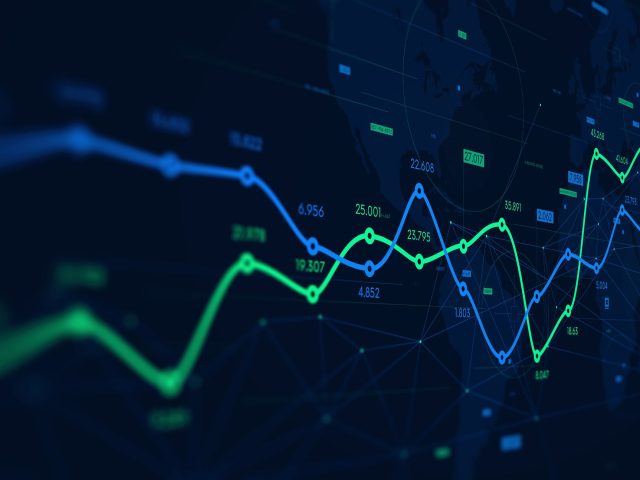
For you to become a stock trader, you will need to learn a lot about financial markets, including stock market deals and others. The same also applies to the budding forex trader. Nonetheless, there are a few things you must do to get started in currency trading or indeed stock trading, Here they are:
Get a top brokerage
You cannot trade the financial market without a good broker. The good news is that there are so many brokers out there that offer online trading. This means that you can trade forex or engage in stock market trading from anywhere you are. As you choose a broker, ensure that this is a regulated firm with a strong history of delivering excellent services to consumers. You may also need to make sure that the brokerage charges low fees.
Learn to Trade
In case this is your first time getting into trading sessions, you will need to learn how to do it. Technical analysis tools and methods should be first on your list. Try and also familiarize yourself with some of the factors that influence stock and forex markets and how the price action moves based on them. While there are many paid trading courses, you can get so much free info on platforms like YouTube and others.
Paper Trade for Awhile
Before you dive into the real world of forex and stock trading, you may want to start with a paper trading account. These demo accounts help with two things. First, they will assist you in fine-tuning your trading strategy. Secondly, you will also be able to get to know how trading platforms work, the fees charged, and how to enter and close positions.
Capital Management
There is this saying in forex and stock trading that, as long as you have capital, you are always in the game. The biggest problem with new traders is that they can blow their accounts in a short time. This means that even when opportunities emerge in the market to really make some decent returns, you won't be able to do it since the capital is all gone.
It is based on this that you must learn crucial capital management techniques. For example, most trading platforms will give you tools to manage risk like the “Stop-loss” feature. Also, you must never risk more than 10% of your account on one single trade. That way, even if the trade goes against you, there is still some capital left to recover your losses.
Learn to Trade: Best Forex Course

There are several forex trading courses that you can use to sharpen your skills. Asia Forex Mentor is however one of the main ones. Created in 2008, the course is designed for beginner forex traders who want to trade currencies easily.
The course's trading methodology emphasizes ROI (Return on Investment) rather than profit/loss percentages, setting it apart from other programs. The ROI approach mimics venture capital firms' strategy of using leverage and compounding to generate a profit overall, even if the bulk of transactions lose money.
How Does a Forex Mentor in Asia Work?

Asia Forex Mentor comprises mostly of a single course, the Proprietary One Core curriculum, as well as a weekly subscriber-only video series (the Golden Eye group).
One Core Program Owned by AFM
The Proprietary One Core Program, which, according to its motto, can convert “new traders into pros,” is Asia Forex Mentor's major offering. This course is divided into 26 lessons with many sub-categories and 63 live videos. You also get lectures of up to 19 hours. Individual lectures are typically 10-20 minutes long. Because the curriculum may be completed at the student's own pace, it is excellent for people who have other obligations.
Pricing, Fees, and the Registration Process
The One Core Program of Asia Forex Mentor costs $997 for lifetime access, which must be paid in advance. The Golden Eye Group subscription is $118 each month. As a result of these expenses, the firm is one of the more expensive trading course suppliers.
The One Core Program offers a seven-day free trial to new customers. The lecture series may be completed in less than a week due to its length of 20 hours. However, trial users will not be allowed to re-watch the content. If students opt not to take advantage of the free trial, they will receive a $57 discount.
| RECOMMENDED TRADING COURSE | REVIEW | VISIT |
|---|---|---|
 | #1 Forex, Crypto and Stocks trading course. Ranked most comprehensive by Investopedia and Best by Benzinga. Free to Try! |  |
Conclusion: Forex vs Stocks?
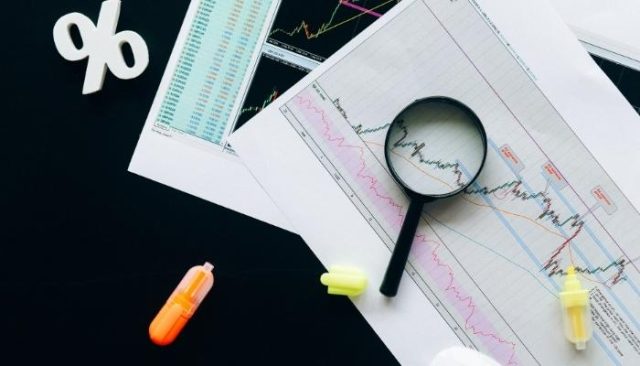
Stock and forex trading offer great opportunities to earn decent returns. However, your choice of any of these two is mostly determined by your trading goals, trading style, and risk tolerance. Forex trading has significantly greater leverage and less regulation than stock trading, making it both extremely profitable and extremely hazardous.
When opposed to stock trading, one unexpected disadvantage of forex trading is that it operates 24 hours a day, which means you may need to work at odd hours to complete certain deals and that the market is continuously moving while you are not working.
With that said, forex and stock trading are two very different types of short-term price action trading. The restrictions governing these markets, the size of the markets themselves, and trading hours are all unique. Besides, the liquidity and volatility of prices, and even the sorts of news that prices respond to are all different between forex and stock trading. It is therefore very important to know the merits and demerits of each, learn how to trade, and decide where you want to put your capital.
Forex vs Stocks FAQs
Is Forex Trading better than stocks?
Both forex and stocks have advantages and disadvantages. But there are some ways in which forex is better. For example, it's a market open for 24 hours so you are not limited when the new york trading hours overlap. There is also massive daily trading volume and besides, many brokerages offer forex trading for clients worldwide.
Is Forex easier than stocks?
This is one is harder to say for sure. As a matter of fact, both forex traders and stock traders will face certain challenges in their day-to-day. It is therefore much better to learn about both these markets and understand what forex and stock traders rely on to make excellent trades.
Is Forex riskier than stocks?
Both the stock and forex markets have risks, but forex is riskier because of the leverage and the large number of factors that impact currency values. Though it's a simple investment choice that may help diversify your portfolio, it should only be considered as part of a retail investor's portfolio if they have the understanding and appetite for risk.
Jordan Blake
Jordan Blake is a cultural commentator and trending news writer with a flair for connecting viral moments to the bigger social picture. With a background in journalism and media studies, Jordan writes timely, thought-provoking content on everything from internet challenges and influencer scandals to viral activism and Gen Z trends. His tone is witty, observant, and sharp—cutting through the noise to bring readers the “why” behind the “what.” Jordan’s stories often go deeper than headlines, drawing links to pop culture, identity, and digital behavior. He’s contributed to online media hubs and social commentary blogs and occasionally moderates online panels on media literacy. When he’s not chasing the next big trend, Jordan is probably making memes or deep-diving into Reddit threads. He believes today’s trends are tomorrow’s cultural history—and loves helping readers make sense of it all.













